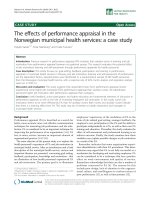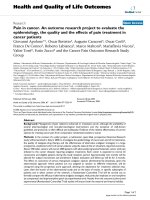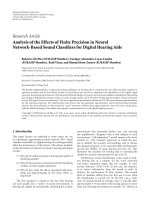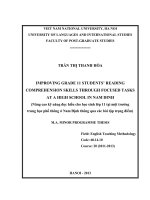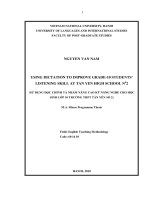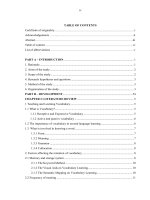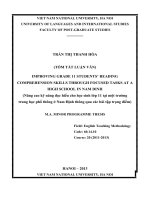The effects of skimming technique in improving grade 12 students’ reading comprehension at muong lat high school
Bạn đang xem bản rút gọn của tài liệu. Xem và tải ngay bản đầy đủ của tài liệu tại đây (151.5 KB, 19 trang )
THANH HOA DEPARTMENT OF EDUCATION AND TRAINING
MUONG LAT HIGH SCHOOL
EXPERIENCE INITIATIVE
THE EFFECTS OF SKIMMING TECHNIQUE IN IMPROVING
GRADE 12 STUDENTS’ READING COMPREHENSION
AT MUONG LAT HIGH SCHOOL
The author: Nguyễn Thị Thoa
Job position: Teacher
Experience initiative about: English
THANH HOÁ – 2019
TABLE OF CONTENTS
Pages
1. INTRODUCTION ...……………………………………………………. 1
1.1. The reason of selecting the topic ...…………………………………….. 1
1.2. Objectives of the study ...………………………………………………. 1
1.2.1. For the students………………………………………………………. 1
1.2.2. For the teachers……………………………………………………….. 2
1.3. Research tasks ...………………………………………………………... 2
1.4. Scope of the study ...………………………………………………...….. 2
1.5. Methodology ...…………………………………...…………………….. 2
2. CONTENTS ...…………………………………………………………... 2
2.1. Theoretical background ………………………………………………... 2
2.2. Reality ...………………………………………………...……………… 2
2.3. Measure implementation ..………………………….………………...… 3
2.3.1. Skimming technique and its importance ………….………………….. 3
2.3.2. Steps in skimming ..……………………………….………………...... 4
2.3.3. Skimming with reading comprehension questions …………………... 4
2.3.4. The adaptation of the textbook …………………………………......... 6
2.3.5. Extra practised exercises ...……………………………………..…….. 8
2.4. The result of researching ...………………………………………........... 13
3. CONCLUSION AND PROPOSAL ...……………………………..….... 14
3.1. Conclusion …………………………………………………………...… 14
3.2. Proposal…………………………………………………………….…... 15
3.2.1. To teachers……………………………………………………..…...... 15
3.2.2. To students…………………………………………………………..... 15
REFERENCES……………………………………………………………... 16
PREVIOUS STUDY………………………………………………………. 17
1. INTRODUCTION
1.1. The reason of selecting the topic
Vietnam is a developing country, in the process of globalization, it is
implementing the opening policies which attract thousands of foreign
investments; the cooperating relationship between Vietnam and other countries
in the world seems to be much stronger. Especially, when Vietnam becomes one
members of WTO, the use of English to communicate and to improve science
and technique levels has become far more necessary than ever before. This
requires the youth to be good at foreign languages particularly at English since it
is the most spoken official language in the world and it is the primary language
used in international affairs. From above reasons, teaching and learning English
become even more essential than ever.
In learning English, students have to master four basic language skills of
the target language. Those basic skills are listening, speaking, reading, and
writing. Speaking and writing are language production, while listening and
reading belong to language comprehension. Among those four skills, reading is
vital in language comprehension. It is one of the most significant skills to learn a
foreign language and to be successful in academic tasks (Anderson, 2003).
According to Carrell (2003) efficient reading is essential for long-term learning
objectives and critical for students to pursue their academic goals. So, it is
important to find out problems that readers face while reading Lau (2006) and
teach them how to use reading strategies to improve their reading skills
effectively.
In the GCSE examination for graduation and higher education, it is reading
skill that is tested and it accounts for 36 percent of the entire marks. That is to
say having a good reading skill is very necessary.
After some years of teaching English at Muong Lat High School, I have
found that the students have not actively learnt English. Their English
competence is very low. They always say that learning English is the most
challenging subject for them especially when reading a passage. Normally, when
students are required to do the reading comprehension exercises, most of them
often read the whole passage, decode the meaning of the passage by translating
words by words whereas the passages are too long with a lot of new words, so
they do not have enough time to finish the tasks. Moreover, other the students do
the reading comprehension questions by circling the options randomly without
applying any reading strategies. As a result, students often get low mark when
doing this kind of exercises. Thus, there is a need to find out effective way to
help students enhance their reading situation.
The above reasons have inspired me to conduct my initiative with the title
"The effects of skimming technique in improving grade 12 students’ reading
comprehension at Muong Lat high school”.
1.2. Objectives of research
1.2.1. For the students
1
This study set out to provide students with skimming technique to deal with
the reading comprehension exercises; helped students identify some kinds of
questions and how to deal with them and apply skimming to do the reading
comprehension exercises well.
1.2.2. For the teachers
The study was to help teacher find out an effective method to improve
students’ reading skill and know how to stimulate students to improve their
reading skills.
1.3. Research tasks
- Find out the reason why most of students cannot do
reading comprehension tasks well.
- Apply my research to teaching practices, then compare,
contrast the implementation of the topic.
- Evaluate and conclude the effectiveness of topic.
1.4. Scope of study
The study was designed to investigate the technique to improve reading
comprehension skill. The finding obtained from this study was to help improve
teaching and learning reading English at Muong Lat High School.
1.5. Research methodology
I wrote this topic based on:
- The method of studying theory.
- The method of investigating and observing.
- Applying the topic to real teaching reading at Muong Lat high school.
- Comparison, collection and summary of the result, effect of the topic.
2. CONTENTS
2.1. Theoretical background
Reading is one of the most important means of obtaining information for
many students (Anderson, 2003). Reading, as an important language skill, raises
students’ awareness; it is also useful for employment and recreational purposes
(Grigg & Mann, 2008). The use of reading strategies is necessary for successful
reading comprehension. According to Richards and Renandya (2002), reading
strategies are plans for solving problems that readers encounter when
constructing meaning out of the text they read. That is to say, to have good
reading comprehension skills is very important. For 12 th graders, it is more
important because having good reading skills is one of the core factors to help
them achieve higher marks in the national GCSE examination.
2.2. Reality
During learning process, students at Muong Lat high school said that doing
reading comprehension is extremely difficult because this skill not only asks
students to read the text but also processes it and understands its meaning. In
fact, observing students doing reading comprehension, when they were
delivered the reading tasks, they all read the passage words by words trying to
decode the meaning of all the words, then they asked the teacher the meaning of
the questions. After that, they looked back the text again to find the answer. This
2
was really time consuming and less effective. Some of them chose the answers
randomly without reading the passages at all. Thus, most of them got bad
results. The results of a small survey conducted by researcher at the beginning of
the school year 2018-2019 lies behind the reasons why the students got low
results in reading as shown in the table below. (The survey was conducted with
the participation of with 70 students in 2 intact classes – 12A and 12C - to find
out the ways they had done the reading tasks and why a lot of them got bad
marks).
The reasons
1. I try my best to identify each question, then scan and
skim the passage to find out the answer.
2. I read the whole passage and stop at every word.
3. The passage is too long in comparison with the time
allotted.
4. I asked teacher the meaning of the questions
5. There are too many new and unfamiliar words in the
passage.
6. I spend time reading and translating all the words
into Vietnamese.
7. I don’t know how to answer each kind of questions.
8. I choose the answer randomly
9. I don’t understand the passage at all and the kinds of
exercise are unfamiliar to me.
10. I can identify the key words in the questions
11. I try to apply some reading tips
12. I can control my reading speed
Percentage
4.3%
92.9%
92.9%
94.3%
86.7%
88.6%
91.4%
85.7%
92.3%
5.7%
4.3%
2.9%
It can be seen from the above table that the majority of the students did not
have good reading skill. Most of them seemed very daunting when facing with
reading comprehension questions. One reason might have come from the teacher
was that students were not taught how to apply the reading techniques whereas
they may save reading time and improve the scores.
2.3. Measure implementation
The first task of my study was to make students understand what the
skimming means, what kinds of questions in the reading comprehension can be
answered by using skimming. Then, I adapted the reading passages in the
textbook to make them familiar to students as well as gave them extra-exercises
to practise.
2.3.1. Skimming technique and its importance
Skimming is one of strategies that require readers to read quickly in order
to get an overview or the general idea or gist of a section. Djuwarsih (2006)
stated that skimming is a skill of getting general idea of a text. It means that we
need only short time to read the text. It is because general idea of the text
3
usually is located at certain lines or certain sentences of the text. In other word,
we only need to read certain parts or lines of the text quickly. It is also supported
by Djuharie (2008) who claimed that skimming refers to look at the text quickly
for getting the main idea from the text. It may be true that by using skimming,
readers don’t need to read the whole text. They only need to look at the text
quickly and find the main idea of the text. So, they wouldn’t waste their time
when they are reading the text. In addition, Hanckock in Simanjuntak (1989: 58)
also says that in preview skimming a reader reads the introductory information,
the heading and subheading, and the summary, if one is provided. After
skimming, decide whether to read the material more thoroughly, and select the
appropriate speed which to read. Skimming to get an overview is an important
skill for students. By skimming to get the “gist” of the material, the students are
able to cover all of it. According to Liao (2011) in Hong (2013: 2), skimming is
done at a speed three to four times faster than normal reading. People often skim
when they have lots of material to read in a limited amount of time
2.3.2. Steps in skimming
Skimming involves not reading every word, but instead moving the eyes
quickly over the text and allowing the main ideas to become obvious. Keep
opening eyes, and move them deliberately quickly across the options, to see
which words are repeated, the main words in each option, and gain an idea of
what the text is overall going to be about. Come to a mental conclusion. Thus, in
order to do the skimming effectively, keep in mind the following steps:
- Read the titles of the passage first. This is the shortest summary of the
contents. Generally, titles will give readers the most important idea of the text
- Read the introductory paragraph.
- Then read the sub-headings (if any) of the text. It will give a basic idea
about the text and what’s in it.
- Look at any illustrations or graphic features.
- If there is no sub-heading, read the first line or first few lines of the text
or even the first paragraph of the passage. It will give the gist of the text.
+ The main idea is often at the first sentence
+ If the author starts with a question or introducing sentence, the main
idea may be at the last sentence.
- For further skimming, read the first lines of all the paragraphs and
focus on the emphasized (bolded & italicized) words, proper names, listing,
quantity words (best, most, worst..), picture or diagrams…in them to get more
ideas about the text.
- Read the whole last paragraph.
2.3.3. Skimming with reading comprehension questions.
Reading comprehension questions are classified in to 3 main categories
namely questions for main ideas, questions for details and inferences and
vocabulary questions. In this study, the author mainly focused on helping
students how to answer the questions for main ideas by using skimming
technique.
4
Most of the reading passages in GCSE examination contain at least one
question for main idea. This type of question can be asked in different ways.
Students can identify it base on different words such as “topic”, “title”,
“subject”, “primary idea”, “main idea”, “main point”, “main concern”, or
“main purpose” and the organization of the passage. It can be shown clearly in
the table below:
Main idea questions
Organizations
+ What is the topic of the
passage?
+ What is the subject of the
passage?
+ What is the main idea of the
passage?
+ What is the author's main
Identifying
point in the passage?
general
+ With what is the author
questions
primarily concerned?
+ Which of the following would
be the best title?
+What is the author’s main
purpose in the passage?
+ The best title for the passage
is…
- Normally at the beginning or at
the end of each paragraph
- At the first paragraph or at the
last paragraph in a reading
passage.
+ Time order/ chronological
order
+ Cause and effect
+ Definition- example
+ Comparison and contrast
+ Problem-solution
Answers
How to
find the
answers
+ Firstly, secondly, finally,
next, then….
+ Because, since, as, lead to,
due to, as a result,
consequently…
+ Define, mean, indicate,
show…
+ On the one hand, on the
other hand, more, less, least,
most…
+ Cause, result in, deal with,
solution…
+ Read the first sentence of each
paragraph
+ Find out the common ideas
between these first sentences
and their relationship.
+ Pay attention to repeated
words
5
+ Quickly skim the whole text to
confirm the main idea.
+ Eliminate the wrong answers,
choose the correct one, the
answers are not too general, too
specific or not mentioned.
+ Students should leave this
question last after answering
other questions to save time
because of its difficulty.
2.3.4. The adaptation of the textbook.
During my teaching process, I have adapted reading passages in the
textbook - especially textbook Tieng Anh 12 – Basic - to make them similar to
the ones appearing in the State’s high school graduation examination. Take the
reading passage in Unit 3 – Ways of socializing – Tieng Anh 12 – Basic as
example number 1:
To attract someone's attention so that we might speak to that person, we
can use either verbal or non-verbal forms of communication. Let us look at nonverbal communication in English. Probably the most common way of attracting
someone's attention is by waving. For example, if we are at a noisy party and see
a friend come in the door about 20 metres away, we might raise our hand and
wave to her as a signal that we see her.
But how hard can we wave in a situation like this? Suppose you are at the
airport, and you see your brother get off the plane and begin walking toward
you. If you are excited, you might jump up and down and wave as hard as you
can to attract his attention. This is the instance where big, obvious non-verbal
signals are appropriate.
There are, however, some social situations where smaller non-verbal
signals are more appropriate. In a restaurant, for example, if we want to attract
the attention of our waiter, we have several choices. We can wait until he passes
near us, catch his eye, and nod slightly to let him know we would like him to
come to our table. Or we can raise our hand slightly to show that we need
assistance. We do not whistle or clap our hands to get the person's attention. That
is considered impolite and even rude.
In most social situations where some informality is allowed, a brief raise
of the hand and a small wave is fine. For instance, if you are walking across the
schoolyard and see your teacher approaching you, a small friendly wave to
attract his or her attention is appropriate.
Once you've got your friend's attention, you shouldn't point at the person
or thing you want her to look at. A slight nod will do. Pointing at someone is
usually considered rude. Of course, there are times when pointing is perfectly
acceptable, such as when a teacher wants to get someone's attention in class. The
teacher often points to the student and says, "David, would you read the next
6
sentence, please?" Pointing here is not impolite; it's simply a way to get
someone's attention.
Task 2: Which of the following would be the best title for the passage?
A. Attracting Attention in normal ways
B. Attracting Attention by Waving
C. Attracting Attention: Non-verbal Cues
D. The Best Ways of Attracting Attention
(Answer: C)
Example 2: The reading passage in Unit 10- Tieng Anh 12 Basic, page107
Endangered species are plant and animal species which are in danger of
extinction. Over 8,300 plant species and 7,200 animal species around the globe
are threatened with extinction, and many thousands more become extinct each
year before biologists can identify them.
The primary causes of species extinction are habitat destruction,
commercial exploitation and pollution. The drainage of wetlands, cutting of
forests, urbanization and road and dam construction have destroyed or seriously
damaged natural habitats. Since the 1600s, worldwide commercial exploitation
of animals for food and other products has seriously reduced the number of rare
species. Toxic chemicals in the air and land, contaminated water and increased
water temperatures have also driven many species to the verge of extinction.
Plant and animal extinction leads to a loss of biodiversity. Maintaining
biodiversity is important for us in many ways. For example, humans depend on
species diversity to have food, clean air and water, and fertile soil for
agriculture. In addition, we benefit greatly from the many medicines and other
products that biodiversity provides.
Different conservation efforts have been made in order to save endangered
species. The Red List - a global list of endangered and vulnerable animal species
- has been introduced to raise people's awareness of conservation needs.
Governments have enacted laws to protect wildlife from commercial trade and
overhunting. A number of wildlife habitat reserves have been established so that
a wide range of endangered species can have a chance to survive and develop.
Task 2. Choose A, B, C or D to complete the following sentences about the
reading passage
5. The best title for the passage is……………….. .
A. Endangered Species and Conservation Measures
B. Endangered Species and their Benefits
C. The Global Extinction Crisis
D. Endangered Species Extinction: Causes and Conservation Measures
(Answer: D)
Example 3: The reading passage in Unit 15 – Women in society – Tieng Anh
12 – Basic, page163
Throughout much of the history of human civilization, deep-seated
cultural beliefs allowed women only limited roles in society. Many people
believed that women’s natural roles were as mothers and wives. These people
7
considered women to be better suited for childbearing and homemaking rather
than for involvement in the public life of business or politics. Widespread doubt
about women’s intellectual ability led most societies to deny education,
employment and many legal and political rights to women. It was men who
controlled most positions of employment and power in society.
The struggle for women’s rights - the rights that establish the same social,
economic, and political status for women as for men - began in the 18 th century
during a period known as the Age of Enlightenment. During this period, political
philosophers in Europe began to argue that all individuals, male or female, were
born with natural rights that made them free and equal. These pioneer thinkers
advocated that women should not be discriminated against on the basis of their
sex.
Today, although their status varies in different countries, women in most parts of
the world have gained significant legal rights. The most important of these are:
the right to have equal work opportunities and pay to men, the right to vote, and
the right to formal education.
Task 3: Choose the best title for the passage
A. Intellectual Ability
B. The Age of Enlightenment
C. Women’s Rights
D. Women’s Role in Education
(Answer: C)
2.3.5. Extra practised exercises
This section provides the readers with some of the extra exercise that the
author gave her students to practise using skimming technique
Example 1: The reading passage in “Ôn tập các chủ điểm ngữ pháp
Tiếng Anh 12- Thư viện Sen Vàng, page 159”
The forests of the tropics produce a magnificent growth of trees, but
commercial lumbering is inhibited by problems that increase the cost of
removal. The proliferation of species that is common to all tropical forests
creates difficulties because many species are worthless. The lumberman combs
the forests, therefore, removing the valuable trees that are convenient to
waterways, and floating them downstream to a saw-mill. Unfortunately, tropical
hardwoods tend to grow slowly; an area once cleared needs substantial time to
recover, forcing the saw-mill to become mobile. Distance to market tends to be
considerable, raising costs of the high costs associated with production. Other
trees are left untouched.
Question 46. What is the main topic of the passage?
A. The growth rate of hardwoods
B. The transportation difficulties
C. The number of useless trees
D. The high costs of commercial lumbering in the tropics.
(Answer: D)
8
Example 2: The reading passage in “ĐỀ THI THAM KHẢO MÔN TIẾNG
ANH- 2019- BỘ GIÁO DỤC VÀ ĐÀO TẠO”.
Visitors to London are struck by the proud splendor and glamour of one of
the world’s oldest capitals, admiring iconic sites like Big Ben, the Palace of
Westminster and Buckingham Palace. However, visitors seeking a glimpse in to
the city’s everyday life should not miss Portobello Market, which is the most
visited market in London
This vibrant market has been featured in a number of films, documentaries
and best-selling books, the most famous being the film “Notting Hill” starring
Hugh Grant and Julia Robert, which bought Portobello Market to the attention
of audiences all over the world.
Portobello Market is divided into different sections selling second hand
items, clothing, jewellery, souvenirs and vegetables. The most sought-after area
is devoted to antiques. Visitors may feel overwhelmed as there are over 1000
booths manned by antique dealers from throughout England. It is a great fun to
browse through antique cameras, watches, pottery and paintings that date back
300 years. They are sold at different prices, so it is possible to find a new goods
bargains. It seems that both buyers and sellers look forward to the weekends
when they can meet and escape from the city’s fast pace at Portobello Market.
When tired from exploring the market, visitors can drop into the nearby
food courts to savour an Indian curry, Italian pizza or sandwiches from Europe.
It is a great pleasure to drink a cappuccino while listening to street performers.
These represent the lively fun of Portobello Market, offering exciting
experiences that keep people coming back.
(Adapted from “Heritage”- Vietnam Airline in flight magazine)
Question 30: What is the passage mainly about?
A. The film “Notting Hill”
B. The city of London
C. Portobello Market
D. European cuisine
(Answer: C)
Example 3: The reading passage in “ĐỀ THI THAM KHẢO MÔN TIẾNG
ANH- 2019- BỘ GIÁO DỤC VÀ ĐÀO TẠO”.
Cambridge University is considering axing compulsory written exams,
allowing students to use laptops or iPads instead, after tutors complained that
students’ handwriting is becoming illegible. Academics say the move, which
would bring an end to over 800 years of tradition, has come about because
students rely too heavily on laptops in lectures and are losing the ability to write
by hand.
Dr Sarah Pearsall, a senior lecturer at Cambridge University, said
handwriting is becoming a “lost art” among the current generation of students.
She added, “It is increasingly hard for our examiners to read students’ scripts.
Those with illegible writing are forced to come back to their college during the
summer holidays to read their answers aloud in the presence of two university
administrators. It is extraordinarily commendable that the University is
considering reforms to its examination practice.”
9
Sir Anthony Seldon, vice-Chancellor of the University of Buckingham, said
it is inevitable that universities will move to computers as handwriting
deteriorates in the coming years. “We have to accept the reality. Handwriting has
now become an optional, not a necessary part of education. There simply isn’t
the same time in the curriculum for learning elegant, beautiful handwriting. Life
is so quick now. Everybody writes as if they were a doctor writing a
prescription,” he said. “Handwriting is not necessary for great thought, great
English, or great intelligence. Some of our finest wordsmiths today write using
laptops, and we have to fight to preserve what is really important, such as the
use of great English or great sentence structures”.
Others, however, were not very positive about the move. Tracey Trussell, a
handwriting expert, argued Cambridge to ensure that students continue to write
by hand. She said, “It is vital that people continue to write by hand. Writing by
hand improves memory and equates to a higher rate of comprehension and
information retention.” There is also concern that schools could follow
Cambridge’s example by moving away from handwriting. Dr Jane Medwell,
associate Professor of Education at University of Nottingham, is concerned that
scrapping handwritten exams in universities could prompt “downward
curriculum pressure” on primary and secondary school to follow suit.
Question 35: which of the following best serves as the title for the passage?
A. Cambridge University in an attempt to improve students’ handwriting
B. Cambridge University pondering Changes to its Exam practice
C. Cambridge University attacked again for Abolishing Written Exams
D. Cambridge University to replace Written with oral Exams
(Answer: B)
Example 4: The reading passage in “ĐỀ THI THỬ THPTQG 2018- THPT
CẨM GIÀNG”.
The hippopotamus is the third largest land animal, smaller only than the
elephant and the rhinoceros. Its name comes from two Greek words which mean
“river horse”. The long name of this animal is often shortened to the easier to
handle term “hippo”.
The hippo has a natural affinity for the water. It does not float on top of the
water, instead, it can easily walk along the bottom of a body of water. The hippo
commonly remains underwater for three to five minutes and has been known to
stay under for up to half an hour before coming up for air.
In spite of its name, the hippo has relatively little in common with the horse
and instead has a number of interesting similarities in common with the whale.
When a hippo comes up after a stay at the bottom of a lake or river, it releases
air through a blowhole, just like a whale. In addition, the hippo resembles the
whale in that they both have thick layers of blubber for protection and they are
almost completely hairless.
Question29. What is the topic of this passage?
A. The largest land animal.
B. The derivations of animal names.
10
C. The characteristics of the hippo.
D. The relation between the hippo and the whale.
(Answer: C)
Example 5: The reading passage in “ĐỀ THI CHÍNH THỨC MÔN TIẾNG
ANH- 2018- BỘ GIÁO DỤC VÀ ĐÀO TẠO”.
A letter of application is a sales letter in which you are both salesperson
and product, for the purpose of an application is to attract an employer’s
attention and persuade him or her to grant you an interview. To do this, the letter
presents what you can offer the employer, rather than what you want from the
job.
Like a résumé, the letter of application is a sample of your work and an
opportunity to demonstrate your skills and personality. If it is written with flair
and understanding and prepared with professional care, it is likely to be very
effective. While the résumé must be factual, objective, and brief, the letters is
your chance to interpret and expand. It should state explicitly how your
background relates to the specific job, and it should emphasize your strongest
and most relevant characteristics. The letter should demonstrate that you know
both yourself and the company.
The letter of application must communicate your ambition and enthusiasm.
Yet it must be modest. It should be neither aggressive nor compliant: neither pat
yourself on the back nor ask for sympathy. It should never express
dissatisfaction with the present or former job or employer. And you should avoid
discussing your reason for leaving your last job.
Finally, it is best that you not broach the subject on salary, indeed, even if a
job advertisement requires that you mention your salary requirement, it is
advisable simply to call them “negotiable.” However, when you go on an
interview, you should be prepared to mention a salary range. For this reason, you
should investigate both your field and, if possible, the particular company. You
do not want to ask for less than you deserve or more than is reasonable.
Question 36: what is the passage mainly about?
A. Advice on how to find good job
B. Things to avoid during a job interview
C. Tip for writing an effective letter of application
D. Differences between a résumé and a letter of application.
(Answer: C)
Example 6: The reading passage in “ĐỀ THI THỬ MÔN TIẾNG ANH2019- THPT QUANG TRUNG”.
Carbohydrates, which are sugars, are an essential part of a healthy diet.
They provide the main source of energy for the body, and they also function to
flavor and sweeten foods. Carbohydrates range from simple sugars like glucose
to complex sugars such as amylose and amylopectin. Nutritionists estimate that
carbohydrates should make up about one-fourth to one-fifth of a person's diet.
This translates to about 75-100 grams of carbohydrates per day.
11
A diet that is deficient in carbohydrates can have an adverse effect 10 on a
person's health. When the body lacks a sufficient amount of carbohydrates it
must then use its protein supplies for energy, a process called gluconeogenesis.
This, however, results in a lack of necessary protein, and further health
difficulties may occur. A lack of carbohydrates can also lead to ketosis, a buildup of ketones 15 in the body that causes fatigue, lethargy, and bad breath.
Question 29. What is the main idea of this passage?
A. Carbohydrates are needed for good health.
B. Carbohydrates prevent a build-up of proteins.
C. Carbohydrates can lead to ketosis.
D. Carbohydrates are an expendable part of a good diet.
(Answer: A)
Example 7: The reading passage in “KHẢO SÁT CHẤT LƯỢNG LỚP 12
THPT NĂM HỌC 2018-2019, MÔN TIẾNG ANH, SỞ GIÁO DỤC VÀ
ĐÀO TẠO THANH HÓA, MÃ ĐỀ 001”.
In most discussion of cultural diversity, attention has focused on visible,
explicit aspects of culture, such as language, food, religion, music, and social
rituals. Although they are important, these visible expressions of culture, which
are taught deliberately and learned consciously, are only the tips of the iceberg
of culture. Much of culture is taught and leant implicitly, or outside awareness.
Thus, neither cultural insiders nor cultural outsiders are aware that certain
“invisible” aspects of their culture exist.
Invisible elements of culture are important to us. For example, how long
we can be late before being impolite, what topics we should avoid in a
conversation, how we show interest or attention through listening behavior, what
we consider beautiful or ugly. These are all aspects of culture that we learn and
use without being aware of it. When we meet other people whose invisible
cultural assumptions differ from those we have learned implicitly, we usually do
not recognized their behavior as cultural in origin.
Differences in invisible culture can cause problems in cross-cultural
relations. Conflicts may arise when we are unable to recognize other’s behavior
differences as cultural rather than personal. We tend to misinterpret other
people’s behavior, blame them, or judge their intention or competence without
realizing that we are experiencing cultural rather than individual differences.
Formal organizations and institutions, such as school, hospital, workplaces,
governments and the legal system are collection sites for invisible cultural
differences. If the differences were more visible, we might have less
misunderstanding. For example, if we met a man in a courthouse who was
wearing exotic clothes, speaking a language other than ours, and carrying food
that looked strange, we would not assume that we understood his thoughts and
feelings or that he understood ours. Yet when such a man is dressed similarly to
us, speaking our language and does not differ from us in other obvious ways, we
may fail to recognize the invisible cultural differences between us. As a result,
mutual misunderstanding may arise.
12
Question 8: what is the main purpose of the passage?
A. To point out that much of culture is learned consciously
B. To describe cultural diversity
C. To explain the importance of invisible aspects of culture
D. To explain why cross-cultural conflict occurs
(Answer: C)
2.4. The result of researching
To have a basic comparison, give out the exact conclusion for the studying
process and applying the topic to teach reading skill Muong Lat high school, I
carried out a quasi-experiment. 70 students in two intact classes 12A and 12 C
were invited to take part in this experiment. The students in experimental group
(12A) were taught how to use skimming technique to deal with reading
comprehension questions in the textbook as well as practised more exercises.
Students in control group (12C) were not applied the topic. At the end of this
semester, I asked the students to do the following exercise in 15 minutes then I
collate the result of class 12A and 12C.
Read the following passage and mark the letter A, B, C to indicate the
correct answer to each of the question.
While fats have lately acquired a bad image, one should not forget how
essential they are. Fats provide the body’s best means of storing energy, far more
efficient energy sources than either carbohydrates or protein. They act as
insulation against cold as cushioning for the internal organs, and as lubricants.
Without fats, energy would be no way to utilize fat soluble vitamins.
Furthermore, some fats contain necessary growth factors and help with the
digestion of other foods.
An important consideration of fat intake is the ratio of saturated fats to
unsaturated fats. Saturated fats, which are derived from dairy products, animal
fats and tropical oils, increase the amount of cholesterol in the blood.
Cholesterol may lead to coronary heart disease by building up in the arteries of
the heart. However, unsaturated fats, derived from vegetable oils, tend to lower
cholesterol if taken in proportion twice that of saturated fats.
The consumption of a variety of fats is necessary, but the intake of too much fat
may lead to a variety of health problems. Excessive intake of fats, like all
nutritional excesses, is to be avoided.
Question 1. The main idea of the first paragraph is
A. Fats have bad image
B. Fats serve important functions in the body
C. Fats store food more efficiently than protein or carbohydrates
(Answer: B)
Question 2. What is the main idea of the second paragraph?
A. Unsaturated fats may reduce cholesterol levels
B. The consumption of any type of fat leads to heart disease.
C. Fats taken in the proper proportion may reduce serum cholesterol.
(Answer: A)
13
Question 3. The main idea of the third paragraph is that
A. People are eating less and less fats today.
B. Fats should be gradually eliminated from the diet.
C. Excessive consumption of fats may be dangerous to one’s health.
(Answer: C)
Question 4. With which of the following is the whole passage primarily
concerned?
A. The role of fats in human health
B. The danger of cholesterol
C. The benefits of fats in the diet.
(Answer: A)
Through the assessment in class 12A with 34 students of my charge, I
achieved the following result:
Clas
Good
Above
Average
Weakness
Poverty
s
(10)
average
(5)
(2.5)
(0)
sizes
(7.5)
34 4 = 11.8% 18 = 52.9% 10 = 29.4%
2 = 5.9%
0 = 0%
And the achieved result of class 12C:
Clas
Good
Above
Average
Weakness
Poverty
s
(10)
average
(5)
(2.5)
(0)
sizes
(7.5)
36
0 = 0%
6 = 16.7% 13 = 36.1% 15 = 41.7%
2 = 5.5%
It can be shown from the two above tables that, students who were trained
skimming technique got higher average marks significantly. It means that they
could identify the questions and knew how to find the answers effectively than
those who were not. By this way, they had enough time to finish their task in
advance.
After a long time of studying and applying skimming technique while
teaching reading comprehension for grade 12th students at Muong Lat I found
that most students became more interested in the reading period. The
atmosphere of the reading time seemed less boring and less pressure. Students
felt more confident of doing reading exercises. They took part in the lessons
more actively and more effectively. The results of the reading tests showed their
reading improvement clearly. This became true when it affirmed the fact that a
good teacher is one who gives students a fishing-rod not the fish.
3. CONCLUSION AND PROPOSAL
3.1. Conclusion
Skimming technique is effective to improve students’ comprehension in the
reading tasks. The increase of scores in experimental group indicates that
treatments given to the group are proved being better to enhance reading
comprehension than the control group. Besides, the experimental group showed
stronger intrinsic motivation, greater interest in the topic, and more involvement.
They were more involved and more interested in the material after they knew
14
how to use this technique. To conclude, skimming technique is efficient to
minimize time consuming in the tasks of reading. Consequently, the researcher
may speculate based on this finding that the faster students’ performance in
reading the better their comprehension in completing reading tasks
3.2. Proposal
3.2.1. To teachers:
- Try to adapt reading passages in textbook as well as provide students with
as many extra exercises to practise as possible which help students develop their
reading skills.
- have students use skimming technique more often to improve reading
comprehension competence.
- Combine different methods in teaching reading for students to encourage
them to participate in the lesson.
3.2.2. To students:
Use the taught technique to do as many reading comprehensions as possible
to improve reading skills. Beside this, spend more time learning vocabulary and
other reading techniques as many as possible to do the reading exercises more
effectively.
Due to the time limitation, I cannot avoid errors. It would be great if I could
receive feedback from other colleagues, especially those who teach English to
make my initiatives more complete and widely applied in the teaching process.
Confirmed by Chief Officer.
Trần Anh Văn
Thanh Hóa, the nineteenth of May, 2019
I assure that this experience initiative
was written by me without copying
others.
Nguyễn Thị Thoa
15
REFERENCES
1. Anderson, N. J. (2002). The role of metacognition in second/foreign language
teaching and learning. ERIC Digest. Washington, DC: ERIC Clearinghouse on
Languages and Linguistics.
2. Anderson, N. J. (2003). Scrolling, clicking, and reading English: Online
reading strategies in a second/foreign language. The Reading Matrix, 3(3), 1-33.
3. Djuharie, O. S,. (2008). Intensive Reading Bottom-up Reading. Penerbit
Yrama Widya.Bandung
4. Djuwarsih, (2006). Learning and Teaching Strategies. Penerbit Wijaya
Saputra. Jakarta.
5. ĐỀ THI CHÍNH THỨC KỲ THI THPT QUỐC GIA MÔN TIẾNG ANH2018- BỘ GIÁO DỤC VÀ ĐÀO TẠO
6. ĐỀ THI THAM KHẢO MÔN TIẾNG ANH- 2019- BỘ GIÁO DỤC VÀ
ĐÀO TẠO
7. Grigg, N. & Mann, R. (2008). Promoting excellence: An international study
into creating awareness of business excellency models”. The TQM Journal,
20(3), 233-248.
8. Harmer, J. 2005. How to Teach English. Cambridge: Longman
9. Nunan David: Language Teaching Methodology, a textbook for teachers.
Longman, 2000
10. Hong, Ng Chiew. (2013). “Teaching of Skimming at Tertiary Level:
Theoretical and Pedagogical Issues”. Published on International Journal of
Bilingual & Multilingual Teachers of English.Vol.1, No.1. University of Bahrain
11. Ôn tập các chủ điểm ngữ pháp Tiếng Anh 12, thư viện Sen Vàng
12. Rèn luyện kỹ năng đọc hiểu môn Tiếng Anh, Vũ Mai Phương, 2015
13. Simanjuntak, E. G. (1989). Developing Reading Skill for EFL Students.
Jakarta: P2LPTK
14. Tieng Anh 12- basic, nhà xuất bản giáo dục
DANH MỤC
16
CÁC ĐỀ TÀI SÁNG KIẾN KINH NGHIỆM ĐÃ ĐƯỢC HỘI ĐỒNG
ĐÁNH GIÁ XẾP LOẠI CẤP PHÒNG GD&ĐT, CẤP SỞ GD&ĐT VÀ CÁC
CẤP CAO HƠN XẾP LOẠI TỪ C TRỞ LÊN
Họ và tên tác giả: Nguyễn Thị Thoa
Chức vụ và đơn vị công tác: Trường THPT Mường Lát
T
T
1.
Kết quả
Cấp đánh
đánh
Năm học
giá xếp loại giá xếp
Tên đề tài SKKN
đánh giá xếp
(Phòng, Sở, loại (A,
loại
Tỉnh...)
B, hoặc
C)
Improving grade 12 students’ Sở Giáo
2017-2018
dục và Đào
C
reading comprehension
tạo Thanh
through scanning technique
Hóa
at Muong Lat High School
2.
3.
4.
5.
...
17
